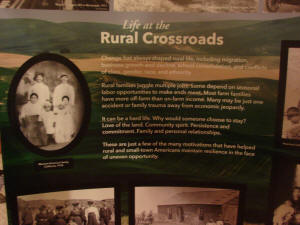|
 Every two years the Smithsonian creates a traveling
exhibit that brings major themes to small museums across the
country. The exhibit currently housed in the Atlanta Museum is
entitled “Crossroads: Change in Rural America.” Every two years the Smithsonian creates a traveling
exhibit that brings major themes to small museums across the
country. The exhibit currently housed in the Atlanta Museum is
entitled “Crossroads: Change in Rural America.”
One aspect of being selected to receive the Smithsonian exhibit is
the requirement that the host community create a companion display
that intersects with the Smithsonian traveling display.
Atlanta residents, museum and library personnel brainstormed for a
year and came up with a locally pertinent exhibit entitled
“Classroom and Community: Changes in Rural America’s Sense of
Community.”
Atlanta did not know until recently what the theme of the
Smithsonian exhibit would be, but it seems the two parts of history
meld beautifully.
Atlanta’s rural history and the flow of education from one room
rural schoolhouses that were a staple of Logan County education for
decades to a consolidated school system, Olympia Community Unit
School District 16, fits perfectly with the theme of change that the
Smithsonian exhibit stresses.
“We have been planning for over ten years to host a Smithsonian
traveling museum. Our recent partnership with Illinois Humanities
and their contacts at the Smithsonian produced the perfect
opportunity to apply for a Museum on Main Street display,” said
Atlanta Museum Director Rachel Neisler.
The Smithsonian has several exhibits touring the country, and the
selection of Illinois to host “Crossroads” could not have been
better.

“With the Illinois Bicentennial and Atlanta’s rural history, we
could not have asked for a better theme for the Atlanta Museum. It
spoke to Atlanta’s history,” commented Rachel.
The “Museum on Main Street” themes are changed approximately every
two years and one state is selected to host it. Within the state,
communities vie for the honor of hosting the exhibit. Within
Illinois, seventeen communities applied for this exhibit and six
finalists were selected. Atlanta was one of those.

Some heavy lifting was necessary to get the
“Crossroads” exhibit to Atlanta. Each community is required to
travel to the exhibit’s prior location, disassemble it, transport
and set it up in their own space.
Last Tuesday, Rachel Neisler and her volunteer team traveled to
Shelbyville and packed the exhibit in fifteen specially designed
cases, lifted them into a large truck, returned to Atlanta and set
up the display on the second floor of the Atlanta Museum.
“Believe me, those cases were very heavy,” said Neisler with a
laugh.
The display will be available for viewing until mid-March when
Marshall County has the task of taking the Smithsonian portion down
and moving it to their community.

The Smithsonian exhibit is fascinating. It is a
pictorial and audio/visual tour of early days America and how the
hardships and joys of rural life shaped the country. Its many themes
are displayed at numerous kiosks, each focusing on an aspect of
rural life.
Wandering through the exhibit and you will be transported back to
days when perseverance in the face of the harsh realities of rural
life created a community of hardy citizens.

Learn how the widely spread residents of rural
America, and of course Logan County, interacted with their far flung
neighbors.

Peruse a small library where books from noted authors
describe the land and its people.
Gaze at an art exhibit that captures the soul of rural America.
Hear and see interviews of those who lived the life of rural
America.
[to top of second column] |

The exhibit is a creative and flowing history lesson that draws the
visitor in. Come get lost in the world of rural America.
The Atlanta exhibit
Volunteers from Atlanta created the companion exhibit “Classroom and
Community: Changes in Rural America’s Sense of Community.”

The display follows the arc of education in Atlanta
and surrounding townships. In the 1850’s one room schoolhouses were
built within two miles of every family with school age children.
Later students were sent to large magnet schools in surrounding
communities. The final iteration of educational journey is the
consolidated school district represented by present day Olympia
School District.
“It took a year of thinking about this theme to finally come up with
the mission statement of what we wanted to do,” said Atlanta Library
and Museum board member Bill Thomas.
The transition from the Smithsonian exhibit designed by national
museum professionals to the Atlanta display, which was designed by
volunteers from Atlanta and the surrounding area, is seamless. The
Atlanta exhibit is every bit as informative and transfixing as the
Smithsonian exhibit.
The Smithsonian exhibit is a macro view of rural American, while the
Atlanta presentation telescopes in for a micro view of life and
education in the history or our own small rural area.
Volunteers for the Atlanta exhibit fanned out in town and rural
Logan County to interview those who lived the education passage in
rural America and collected mementos from school days that had been
stored away for decades.
Each station focuses on an aspect of education in rural Atlanta that
formed the lives that created a community, and how that community
changed as the educational system changed.
The two exhibits currently on display at the Atlanta Museum are
absolutely worth a visit. You’ll want to take the time to go there
and become immersed in our shared history.

Another event occurred Friday evening during the initial viewing of
the exhibits. The first floor of the Union Building is being turned
into a visitor’s center for those traveling through Atlanta.
Just minutes before the Friday evening event
commenced, a mural on the walls of the visitor center was unveiled.
It depicts the history of Atlanta and covers much of the wall space.
It is spectacular.

Artist Regan King of Normal is responsible for the
new work. Ms. King was selected as the muralist after Atlanta
Library Director Cathy Maciariello reached out to a friend in the
Bloomington/Normal arts community for a recommendation.
King took to her commission with unbridled enthusiasm and presented
a volunteer committee from Atlanta with her idea. Thus began a
collaboration that resulted in six reformulations of King’s original
idea. The final design brought the artist together with the Atlanta
residents to create lasting friendships and a wonderful visual
history of their town.
“We had a wonderful time working with Regan. She was open to our
suggestions of where we wanted the art to go,” said volunteer Susan
Hoblit. After sketching the finished work on the walls, a call went
out for volunteers to become artists themselves and fill in the
lines with paint. People who said they could not paint a wall in
their home gathered with Regan King and completed a true work of
art.
The finished mural can be seen through the front window of the
visitor center as a person drives down old Route 66. Stop in and see
the colors and ribbons that convey a sense of community. And
remember, one artist and numerous amateurs created the work of art.
Volunteers who take pride in their community are the Atlanta way.
The Smithsonian exhibit and Atlanta companion display is open
Thursday through Saturday from 10 a.m. to 3 p.m., and Sunday from
noon to 3 p.m. through March 16.
[Curtis Fox] |